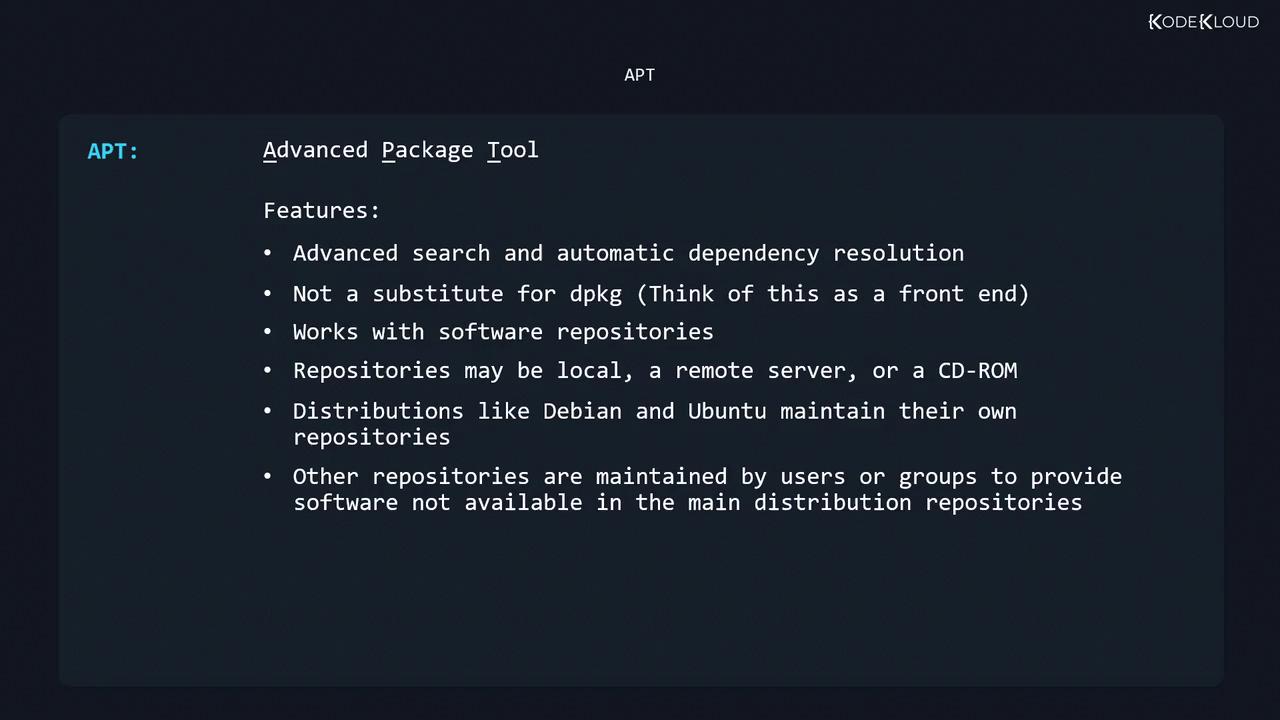Linux Professional Institute LPIC-1 Exam 101
Linux Installation and Package Management
Use Debian Package Management Part 2
In this guide, we’ll dive deeper into Debian package management using APT (Advanced Package Tool). APT is a powerful front-end to dpkg that automates dependency resolution, offers advanced search capabilities, and simplifies package installation, upgrades, and removals. It works with software repositories—which can be remote servers, local mirrors, or even CD-ROMs. Official repositories are maintained by distributions like Debian and Ubuntu, and you can add third-party or custom repos as needed.

APT Command-Line Utilities
| Command | Purpose |
|---|---|
sudo apt-get [options] | Install, upgrade, or remove packages |
sudo apt-cache [options] | Search and display package information |
sudo apt-file [options] | Search for files within packages (inst./uninst.) |
sudo apt [options] | Unified interface combining apt-get & apt-cache |
Warning
The apt command is more user-friendly, but it may not be installed on older systems. Always know how to use both apt-get and apt-cache.
1. Updating the Package Index
Before installing or upgrading any software, refresh your local package index:
sudo apt-get update
This fetches the latest package lists from all configured repositories.
2. Installing and Upgrading Packages
To install a new package—or upgrade it if already present—use:
sudo apt-get install xournal
Sample output:
Reading package lists... Done
Building dependency tree
Reading state information... Done
The following NEW packages will be installed:
xournal
0 upgraded, 1 newly installed, 0 to remove and 75 not upgraded.
Need to get 285 kB of archives.
After this operation, 1041 kB of additional disk space will be used.
Tip
You can install multiple packages at once, for example:sudo apt-get install git curl vim
3. Removing and Purging Packages
Remove (keep config files):
sudo apt-get remove xournalPurge (remove config files too):
sudo apt-get purge p7zip # or equivalently: sudo apt-get remove --purge p7zip
APT will list affected packages and ask for confirmation before proceeding.
4. Fixing Broken Dependencies
When a manual .deb install triggers unmet dependencies:
sudo dpkg -i --force openshot-qt_2.4.3+dfsg1-1_all.deb
# ... dpkg: dependency problems prevent configuration of openshot-qt: ...
Restore consistency by installing missing dependencies:
sudo apt-get install -f
This will automatically fetch and install the required packages.
5. Upgrading All Packages
Refresh your index:
sudo apt-get updateUpgrade upgradable packages:
sudo apt-get upgrade
Example summary:
Reading package lists... Done
Building dependency tree
Reading state information... Done
Calculating upgrade... Done
The following packages have been kept back:
gnome-control-center
The following packages will be upgraded:
cups cups-bsd cups-client cups-common cups-core-drivers cups-daemon ...
74 upgraded, 0 newly installed, 0 to remove and 1 not upgraded.
Need to get 243 MB of archives.
After this operation, 30.7 kB of additional disk space will be used.
Do you want to continue? [Y/n]
Upgrade a Single Package
To upgrade one package without affecting others, use:
sudo apt-get install --only-upgrade unrar
6. Cleaning the Package Cache
APT caches downloaded .deb files in /var/cache/apt/archives. Free up disk space by running:
sudo apt-get clean
7. Searching Packages with apt-cache
Search by keyword:
sudo apt-cache search p7zipSample output:
liblzma-dev - XZ-format compression library - development files liblzma5 - XZ-format compression library forensics-extra - Forensics Environment - extra console components (metapackage) p7zip - 7zr file archiver with high compression ratio p7zip-full - 7z and 7za file archivers with high compression ratio p7zip-rar - non-free rar module for p7zipShow package details:
sudo apt-cache show liblzma5Key fields:
Package: liblzma5 Version: 5.2.4-1 Depends: libc6 (>= 2.17) Description-en: XZ-formatted compression library LZMA is the successor to the Lempel-Ziv-Markov-chain Algorithm...
8. Configuring Software Repositories
Repository entries reside in /etc/apt/sources.list or under /etc/apt/sources.list.d/. Each line follows:
<type> <URL> <distribution> <components>
Example (Ubuntu “disco”):
deb http://us.archive.ubuntu.com/ubuntu/ disco main restricted universe multiverse
| Component | Description |
|---|---|
| main | Officially supported open-source packages |
| restricted | Supported closed-source software (e.g., proprietary drivers) |
| universe | Community-maintained open-source packages |
| multiverse | Unsupported closed-source or patented software |
| contrib | DFSG-compliant packages depending on non-main components |
| non-free | Packages not compliant with the Debian Free Software Guidelines |
| security | Security updates |
| backports | Newer versions backported from testing or unstable branches |
After editing or adding a .list file, always run:
sudo apt-get update
Example: Adding Debian Buster Backports
sudo vi /etc/apt/sources.list.d/buster-backports.list
Append:
deb http://deb.debian.org/debian buster-backports main contrib non-free
deb-src http://deb.debian.org/debian buster-backports main contrib non-free
9. Using apt-file
The apt-file tool lets you search for individual files within packages, even if they aren’t installed.
Install and initialize:
sudo apt-get install apt-file sudo apt-file updateList package contents:
sudo apt-file list unrar # unrar: /usr/bin/unrar-nonfree # unrar: /usr/share/doc/unrar/changelog.Debian.gzSearch for a specific file:
sudo apt-file search libsdl2.so
Unlike dpkg-query, apt-file can search across all available (but not yet installed) packages.
Test your knowledge with the included quiz!
Watch Video
Watch video content